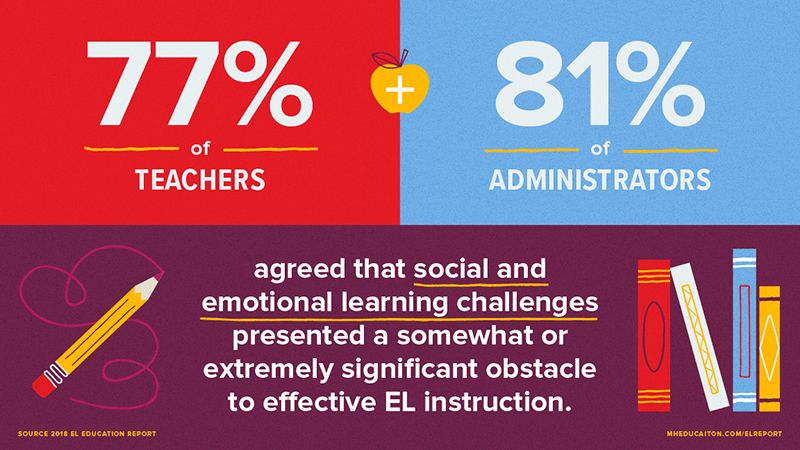NEW YORK, February 21, 2019 – As the number of English Learners (ELs) continues to grow in schools across the United States, educators remain optimistic about the academic potential of these students, according to the second annual English Learners Report by learning science company McGraw-Hill. However, teachers say that social and emotional obstacles present the most significant challenge to these students’ ability to succeed.
According to the survey, a strong majority of educators (75 percent of teachers and 85 percent of administrators) are optimistic about ELs’ ability to succeed academically. The majority also believe EL instruction contributes to their students’ improved academic language performance and overall English proficiency. Furthermore, most educators surveyed expressed that EL instruction is funded sufficiently in their school or district, and that access to EL instructional resources has increased over the past five years.
However, survey results highlight gaps and areas where additional support may be needed. Many educators believe that social and emotional obstacles, such as having overcome trauma or insufficient language skills to communicate with other students, present the biggest hurdle to ELs success. Other prominent challenges called out by teachers include the lack of family and community support, and anxiety around the political climate. Overall, 69 percent of administrators and 65 percent of teachers reported that conversations about immigration impact their school/classroom environment, and noted that discussions around immigration were more prevalent than those about other social and political issues, including healthcare, climate change and gun violence.
“It’s encouraging that educators feel EL instruction is translating into positive academic benefits for many ELs, but these survey findings also underscore the importance of social and emotional learning in schools,” said Heath Morrison, President of McGraw-Hill’s School Group. “As education professionals, we must continue to do everything we can to ensure that our students have the social and emotional support that they need, so that they can succeed academically and in life.”
Educators Highlight Social and Emotional Learning as the Most Prominent Obstacle for ELs
According to the survey, educators see a clear link between ELs’ social and emotional wellbeing, and their ability to succeed academically.
- 77 percent of teachers and 81 percent of administrators agreed that social and emotional learning challenges (trauma, inability to communicate with other students) presented a somewhat or extremely significant obstacle to effective EL instruction.
- Both teachers (70 percent) and administrators (67 percent) identified lack of family and community support as the second biggest obstacle to effective EL instruction.
- While teachers called out “anxiety surrounding the political climate” as the third most important obstacle to effective EL instruction (66 percent), administrators identified “student reluctance to participate” (60 percent).
- 69 percent of administrators and 65 percent of teachers reported that conversations about immigration affect their school/classroom environment, and noted that discussions around immigration were more prevalent than those about other social issues, including healthcare, climate change and gun violence.
Educators Generally Feel Equipped to Teach ELs
Survey findings indicate that despite gaps, a majority of educators believe their school or district provides sufficient ongoing professional development opportunities to hone their skills, which improves their ability to teach.
- Seven out of 10 teachers agree that their school or district provides sufficient, ongoing professional development to support ELs’ success, an increase from 55 percent in the 2017 iteration of this survey. Also, 76 percent agreed in 2018 that the training provided by their school or district improves their ability to teach English Learners.
- Both teachers (51 percent) and administrators (55 percent) agreed that they have seen an increase in the EL resources made available to them over the past five years, indicating that EL instruction is becoming an increasing priority.
- Still, gaps remain: A large number of administrators (46 percent) and teachers (36 percent) feel that they have not received enough EL training/professional development. Among both groups, almost one in four indicate that they do not feel confident applying the training/professional development they had received.
Adaptive Learning Tools and Interactive Approaches Are Most Effective for EL Instruction
Teachers and administrators reported that adaptive tools and interactive instructional approaches are most effective for EL instruction.
- Teachers and administrators highlighted interactive classroom games and collaborative group work as the most effective approach to instruction.
- Teachers and administrators alike find adaptive learning technologies to be the most effective resources for EL instruction.
- Audio-visual resources were reported to be the most widely used classroom instructional tools, used by 77 percent of teachers and 76 percent of administrators, followed by adaptive learning technologies and free online educational resources.
“The results of this survey indicate that certain tools and approaches are considered more effective by educators, and that’s valuable when looking at how we can help support EL students and their teachers,” said Morrison. “As we work to support a growing population of EL students, we’ll need to ensure teachers continue to have access to the resources they know to be most impactful, as well as the professional development that they need to thrive.”
